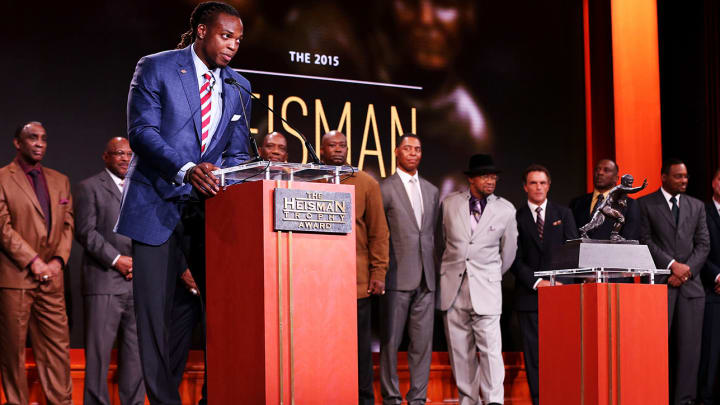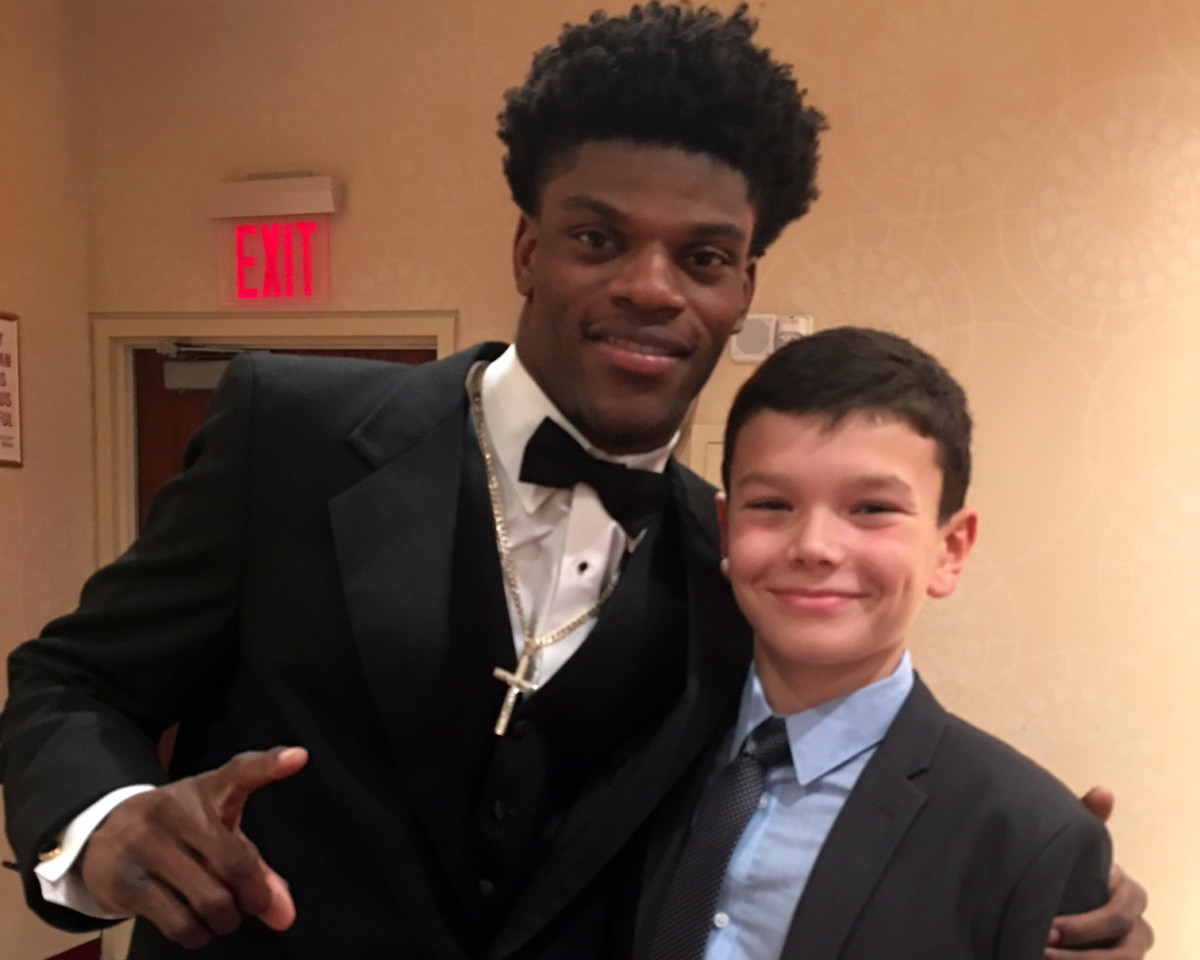Friction Between Past Winners and the Heisman Trust Casts Cloud Over Ceremony

There is, as usual, plenty of drama surrounding the announcement of this year’s Heisman Trophy winner. But this year, the question isn’t who it’s going to be, it’s who is—and is not—going to be in the audience at Saturday night’s ceremony.
This has nothing to do with the runaway favorite, Oklahoma senior quarterback Baker Mayfield. This is about disagreements between the Heisman Trust (the board that controls the award) and a growing group of winners past who don’t like the way the board does business and are concerned about the trophy’s future.
“The Heisman’s star is fading,” says Gary Beban, the UCLA quarterback who won the trophy in 1967. “We’ve been trying to work with this board for years and we’ve really gotten nowhere.”
In October, the former UCLA quarterback told the board that he’d register his dissent by being a no-show this year, including skipping events marking his own 50th anniversary. “I’m sad it’s come to this,” Beban told me. “I’ve always envisioned this as sort of a peak moment in the highlight film of my life.”
Making the decision to stay away has been emotional for Beban, something I know first hand: Gary is my father. For years, we’ve been talking about his feelings about the Trust as well as what’s been going on behind the scenes.
As I kid, I used to love going to the Heisman events. Back then, they were at the Downtown Athletic Club. Football legends were just all over the place. I’ll never forget Bo Jackson slapping me on the shoulder with a hand that felt as solid as a T-bone steak. When I was in high school, Earl Campbell asked me my waist size (it was 34") and proceeded to tell me that when he was playing pro, each one of his legs was a 34".
And guess what? Doug Flutie is not short! A 5'10" guy actually only looks short when he’s being chased around a football field by freakishly big human beings.
For the past few years, I’ve taken my children to the ceremonies, who love it as much as I did. When he’s my age, my son will probably still be talking about the time Robert Griffin III cheerfully hiked up the trousers of his tux to show him his Superman socks. Last year, when I made her laugh, my daughter lost her balance and fell over trying to hold her Heisman pose next to the new trophy.

This year, the kids are bummed but understanding about why Papa’s not going. And Dad won’t be the only former winner sitting this one out. Tim Brown, who took home the trophy in 1987 as a Notre Dame wide receiver, also won’t be in New York this weekend. “Unless there are changes, I have no plans to ever go again,” Brown told me. “It’s just too difficult and frustrating.”
A universally held opinion among winners I spoke to—even ones planning on attending this weekend, such as 1972’s Johnny Rodgers—is that there should be at least one winner on the board. “We want a seat at the table because the whole thing exists based on our images,” the former Nebraska running back said.
When I reached out to the Trust for comment about Dad, Brown, and the broader question of winner-board relations, I heard back from executive director Rob Whalen, who is not a board member. Whalen said in an email that it’s disappointing when one of the “Heisman family” is absent, adding that the Trust remains “steadfast in its commitment to protect the Trophy’s integrity and not allow it to be improperly commercialized for any purpose.”
The Heisman Trophy trust is registered as a 501(c)(3) educational charity. According to the Trust’s 2015 Federal Form 990 (the most recent available) the Trust distributed $1,731,494—not that much more than its operating expenses of $1,334,216—all while sitting on investments valued at more than $19 million.
That seeming stinginess just doesn’t sit well with many winners. One who asked not to be named said, “We want to know what’s going on. We’d like to have a say in how it’s managed. We don’t know how the board makes decisions.”
Another complaint is that the board has fallen behind the fast-changing culture of college sports and modern media. “The trophy has grown tremendously in the 45 years since I won,” Rodgers said. “It’s a business in itself. We need to be making big gains every year, you know? This board doesn’t have that kind of expertise. It was never set up to do that.”
Signs abound that the Heisman’s wattage has dimmed. Long gone are the days when sports legends like Yogi Berra and celebrities such as Ed Sullivan showed up at the ceremonies.
The television audience is shrinking too: The 2.64 million people who tuned in last year is believed to be the smallest Heisman audience ever for the trophy presentation on ESPN.
The way my dad and others see it is that the Heisman is the most famous individual award in college sports—perhaps all of sport—and the board isn’t doing enough to make it a force for good. “They’re mismanaging a unique legacy brand,” Dad said.
Referring to the long-running Heisman-themed Nissan television ad, he asked, “Why, for example, isn’t there an actual Heisman House on various college campuses, a place where student-athletes and kids in the area could get tutoring? Why aren’t we doing things like raising millions for research into brain trauma?”
“The trophy and the winners are totally underutilized,” another former winner lamented. “This thing could be doing so much more.”
Several discontented winners I spoke to also brought up the story of 1994 winner Rashaan Salaam, who, in apparent financial as well as emotional distress, committed suicide last December. They wish that somehow, the board and winners alike could have extended Salaam a helping hand. “It was just a week before the ceremony,” Brown said. “Imagine if he’d known he could call the Trust. Or that if the board had known and somehow let the rest of us know the man was struggling. We would’ve tried to help him ourselves. I’m just sad we didn’t know about it.”
There’s one other emotional issue in play this year, but it’s got nothing to do with the board: It’s a desire that the disagreements don’t somehow diminish the moment for “the kid”—the name Dad has long called the new winner. “I want all of us to be there to give him a hug, welcome him to the club, meet his family,” said Nebraska quarterback Eric Crouch, the 2001 winner. “To us, you know, that’s the best part. It should be something we all never want to miss.”
“It’s the baddest fraternity in the world, right?” Rodgers told me, laughing. “We only admit one guy a year.”
Out of 59 living recipients, just 22 were at last year’s events. Whalen says the Trust expects a higher number this year, but Brown doesn’t think that’s where this is headed. “The board says they don’t need us,” he said. “Well, if they keep losing guys, they’re going to see how that works out.”
Crouch agrees. He thinks the numbers will keep falling and interest keep fading. “We are just at a stalemate with the board,” the former Nebraska quarterback told me. “The way things are going, it’s not hard to imagine an award ceremony with no winners and no sponsors someday.”
